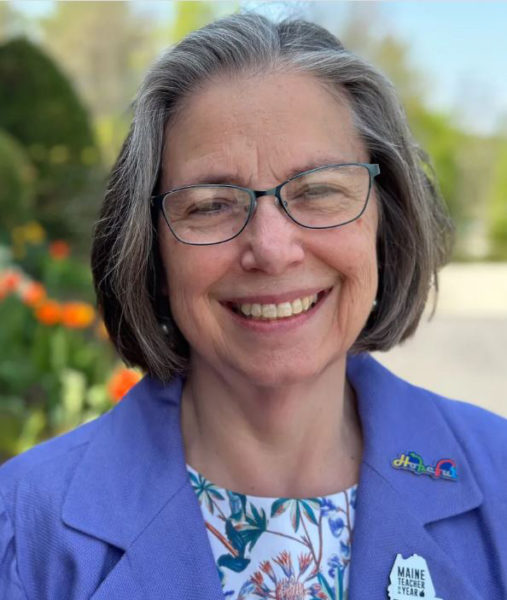
Miller School teacher Edith Berger has advanced to the semifinals for the Maine Teacher of the Year competition. (Photo courtesy Maine Department of Education)
Edith Berger, a sixth grade writing and social studies teacher at Waldoboro’s Miller School and Lincoln County’s Teacher of the Year, has advanced to the state semifinals for the Maine Department of Education award. She is bringing her dedication to civics education to the state program, an experience that she said has been life-changing.
The award, a Maine Department of Education program administered by Educate Maine, recognizes public school educators in each county and one state winner each year. Teachers are nominated by community members for service in education and to their students.
Berger was notified of her semifinalist status in June and spent the next month preparing for the finalist selection event in late July, delivering an eight-minute speech, writing two essays, and participating in a panel discussion.
Out of the eight semifinalists, four finalists will be announced in September and the state’s teacher of the year will be announced the following month.
Berger’s speech centered on social studies instruction, especially civics, in the elementary school classroom, a subject she said she never misses a chance to talk about.
In her classroom, Berger makes an effort to include five civics principles — courage, honesty, compassion, respect, and responsibility — when teaching history. For example, when students learn about American colonies, they investigate these concepts within the actions of people they study.
“It’s important for kids to see how what we think of as our principles were made manifest in the way these colonies were set up,” she said. “I hope people see how those traits are practiced by historical figures.”
She said civics is typically introduced to students in high school, and can take “second fiddle” to reading and math instruction. Berger would like to see individuals, school districts, and the nation thinking about where civics fits into education and into every part of life.
“When they get to sixth grade, I try to get them to understand that those attributes don’t just hang in space,” she said.
The daughter of a civics teacher, Berger grew up with a civics education in and out of the classroom. She said that in 2016, she felt the country was losing touch with its principles, and she began to think carefully about how she taught civics.
“For me, it has to do with impact,” she said. “They may not remember an exact fact, but they’re going to remember how it made them feel … The impact can play out over years, and learning has to be reinforced over years. Hopefully, learning bubbles up.”
Berger has a personal sixth value, equity, which is important to her in the classroom as she views her students as individual learners.
She said the past few years have been difficult for children, and civics values can help her students relearn how to get along with each other.
Berger has also been busy with her fellow teachers of the year developing an ‘action project’ to be announced, which incorporates new science research about reading.
She said the group has bonded and supports each other; she feels enlightened every time they talk.
“We teach different things, but we’ve got this underlying belief in what we we’re doing, and it just binds us together, and it’s a joy … it’s just so invigorating,” she said. “I’m running out of superlatives.”
Berger became a teacher “by accident” at age 50. After moving to Maine, she could not find a job in her previous field of nonprofit administration and began volunteering at Miller School.
She was invited to substitute, then to be a long-term sub, and joined the staff as a second grade teacher the following year.
“I became a teacher by accident,” she said. “I stayed a teacher because of Miller,” citing the support of administrators and staff.
She is now in her 18th year of teaching with no plans to leave. Berger previously worked with the Maine Department of Education and is currently a member of the Maine Writing Project, a University of Maine program for developing writing skills in the classroom.
At Miller, she hopes to share her enthusiasm and the feeling of having her voice heard with fellow teachers. She plans to speak at the first staff meeting of the school year and work to mentor other teachers.
“I think it’s important that if I’m being offered this opportunity…I need to share that megaphone,” she said. “I think if I’m benefitting from this cohort, I should be passing that around. I should be sharing that wealth.”
To Berger, having educator voices heard does not necessarily mean requests for funding, although she said Miller School is badly in need of expansion and she appreciates increased resources from the district’s board of directors in recent years.
“It’s often about how we feel honor as a profession,” she said. “By honor, I mean we are professionals and we want to be treated as such, professionally recognized as such, given a chance to shine, and not be told what to do in a way we feel contradicts our principles.”
As the finalist selection process continues, Berger said she looks forward to continuing to work with her cohort across the state. She did not cry when she found out she was a semifinalist, but she did when she read messages of support from other teachers who didn’t advance.
“We don’t feel like we’re competing against each other,” she said. “We feel like we’re doing something together. It’s important people know that this is not about being the best teacher. It’s not a crown and sash award. It’s about service.”



